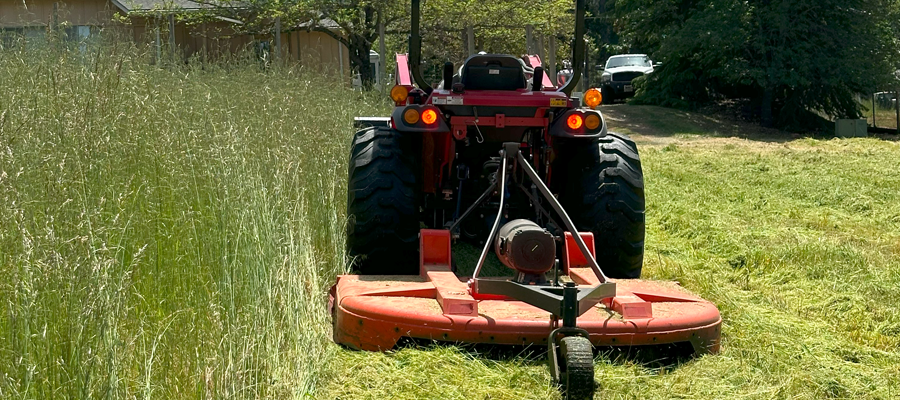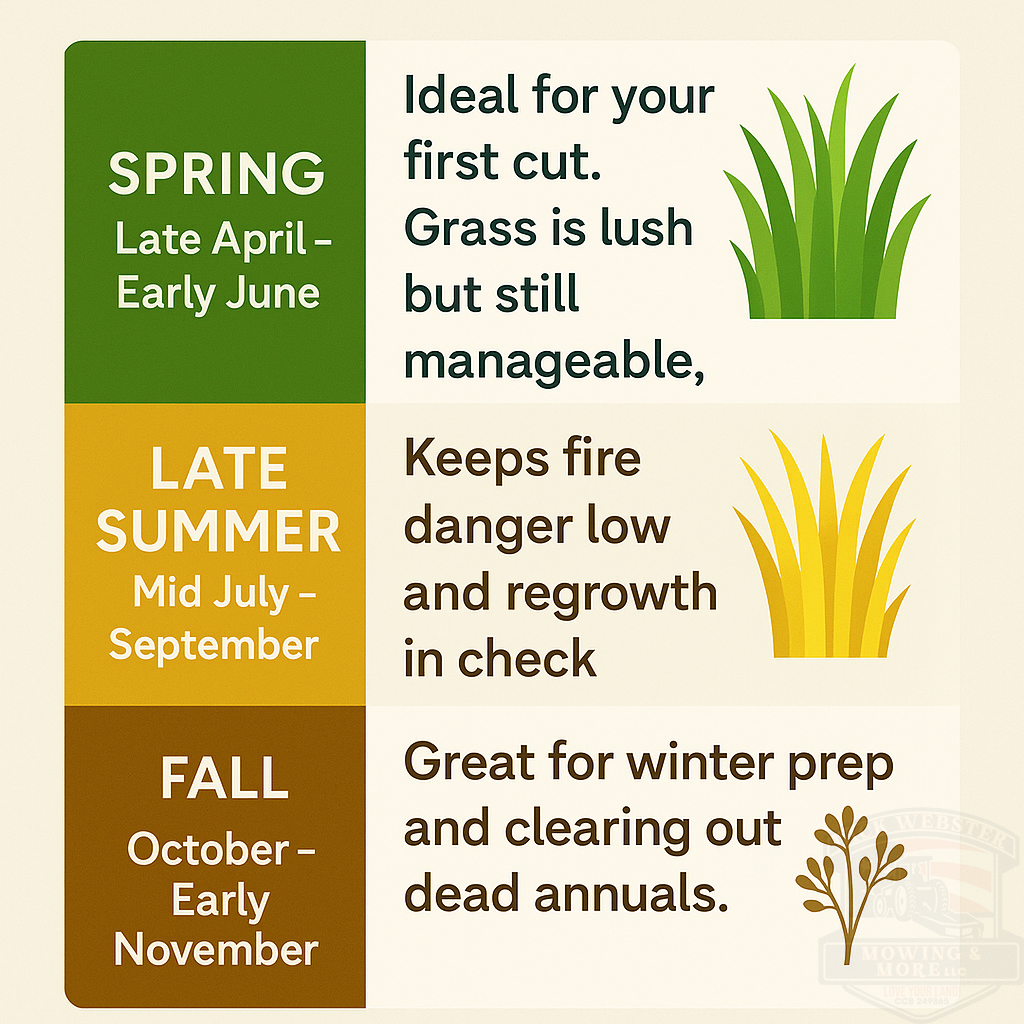Understanding the Value of Timely Field Mowing Services
In Grants Pass and surrounding areas like Merlin, Rogue River, and the Applegate Valley, the growing season starts early and accelerates fast and require early field mowing services. Fields that seem manageable in April can become tangled jungles by June if left unattended. For property owners, this isn’t just an eyesore—it’s a liability.
Field cutting provides more than just visual upkeep. They serve as a critical component of responsible land management. Mowing at the right time prevents overgrowth, helps manage invasive weeds, controls pests, and contributes to wildfire safety. These benefits aren’t just practical; they directly influence your bottom line—affecting everything from maintenance costs to long-term property value.
How Field Mowing Supports Defensible Space and Fire Safety
Southern Oregon is no stranger to fire danger. Each year, the Oregon Department of Forestry and local fire districts stress the importance of creating defensible space around structures. For landowners in rural Grants Pass or near the forested edges of Wilderville or Murphy, field mowing can mean the difference between a safe zone and a firetrap.
By cutting tall grass and removing dense vegetation before peak fire season, property owners reduce the fine fuels that fires feed on. When a field is mowed consistently, especially within the first 100 feet of a structure, it helps slow fire spread and provides firefighters with a buffer zone to operate in if the worst happens. Waiting until the grass has dried out not only increases the danger but may also violate local defensible space ordinances in high-risk zones.
The City of Grants Pass takes this issue seriously. Local code enforcement may issue citations and fines ranging from $295 to $500 to property owners who allow weeds or other flammable vegetation to become unsightly or pose a fire hazard. This ordinance ensures that all properties are contributing to a safer, more fire-resilient community. Field mowing is one of the simplest and most effective ways to stay compliant and reduce personal liability.

Preventing the Spread of Invasive Weeds Through Consistent Mowing
Southern Oregon’s climate is ideal for growth—but that includes plants you don’t want. In Grants Pass, fields left unmowed become breeding grounds for invasive weeds like yellow star thistle, Himalayan blackberry, and medusahead rye. These species outcompete native vegetation and spread aggressively across property lines, ditches, and into neighboring fields.
Timely mowing interrupts their seeding cycle. For many invasive species, even a single well-timed mow before they flower can reduce their spread by over 80%. Over time, this keeps management costs lower and promotes healthier, more usable land.
Poorly timed mowing, on the other hand, can actually worsen the problem—breaking mature seed heads and scattering them further across your land. This is why professional field mowing services use careful timing and the appropriate equipment to minimize disruption while maximizing control. Just as important, responsible operators take the time to clean mowing equipment between jobs. This step helps prevent the spread of invasive weed seeds from one property to another, which is especially critical in rural areas where plant infestations can easily jump fences and take root in new soil.
Managing Rodents and Pests in Rural Fields
Tall grass doesn’t just harbor weeds—it’s also a haven for rodents, snakes, and insects. In many Grants Pass neighborhoods on the rural fringe, it’s not uncommon for overgrown fields to host mice, rats, and gophers. These pests multiply quickly and often migrate toward nearby homes, outbuildings, and gardens in search of food and shelter.
Consistent field mowing removes their cover and reduces nesting zones. With fewer hiding places, rodent populations naturally decline, reducing the risk of property damage, disease transmission, and secondary infestations by predators like snakes. Mowed fields are also easier to monitor for burrows and tunneling activity, which allows property owners to intervene early and prevent larger infestations from taking root.
Overgrowth can also interfere with the natural balance of predators. Predatory birds and beneficial wildlife often avoid overly dense vegetation because it limits visibility and movement. By keeping grasses short and manageable, landowners help support a more balanced ecosystem where pests are naturally kept in check.
Additionally, tall grasses invite ticks and mosquitoes, both of which become more active as temperatures rise. These pests pose risks not only to humans but also to pets and livestock. Reducing the vegetation they rely on for breeding and cover helps lower the population of disease-carrying insects across your property, improving health and comfort for everyone who lives or works there.
How Mowed Fields Preserve Long-Term Property Value
While wildfire prevention and pest control provide immediate benefits, field mowing plays a larger role in long-term land value—something every Grants Pass property owner should consider.
A field that’s mowed regularly shows potential buyers or renters that the land is actively managed. It looks cleaner, feels safer, and is easier to walk or drive through. This can improve your standing in a competitive real estate market where even minor visual cues impact perception.
Unmanaged fields, on the other hand, suggest neglect. Overgrown grass, patches of invasive plants, and rodent trails can decrease perceived value and make the land harder to use or develop. Worse yet, neglected land often leads to higher clean-up costs later on. Waiting until a field becomes unmanageable usually means needing heavier equipment, longer labor hours, and sometimes even permitting for land restoration.

When to Schedule Field Mowing in Grants Pass
Timing matters more than frequency when it comes to effective mowing. In the Grants Pass area, spring growth typically begins in late March and peaks by early June. Mowing during this window helps reduce weed pressure, keeps fire fuel loads in check, and ensures grasses are cut before seeding.
A follow-up mow in mid-to-late summer—especially if there has been rain—helps manage regrowth and maintain clear visibility across the property. In some areas of the Applegate or Murphy hillsides, where moisture lingers longer, an early fall cut may also be beneficial to reduce fuel buildup before winter.
Waiting too long can result in dry, dense vegetation that’s harder (and more expensive) to cut safely. Scheduling your mowing service ahead of peak season ensures availability and helps operators provide cleaner, more even cuts.
Choosing the Right Field Mowing Services for Your Property
Not all mowers are created equal, and not every field should be treated the same way. Fields with uneven terrain, slopes, or significant brush growth require experience and equipment tailored to rural Oregon landscapes.
Professional-grade field mowers can handle thick vegetation without damaging the root systems or compacting the soil. More importantly, experienced operators understand how to mow safely near sensitive zones like irrigation ditches, fences, or wildlife areas.
For property owners in Grants Pass, hiring a trusted local service ensures the job gets done efficiently, responsibly, and in line with state and county guidelines for fire safety and land care. Whether you manage a few acres on the edge of town or a larger property in the valley, timely mowing will always cost less than neglect.
Take Control of Your Land Before It Controls You
Timely field mowing services in Grants Pass are more than just maintenance—they’re an investment in the safety, usability, and value of your land. From reducing fire risk and controlling invasive weeds to keeping pests at bay and enhancing visual appeal, seasonal mowing protects what matters most.
Don’t wait for the grass to get ahead of you. Learn more and schedule your next field mowing service before the season ramps up.

